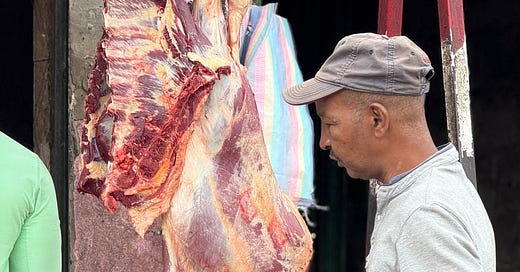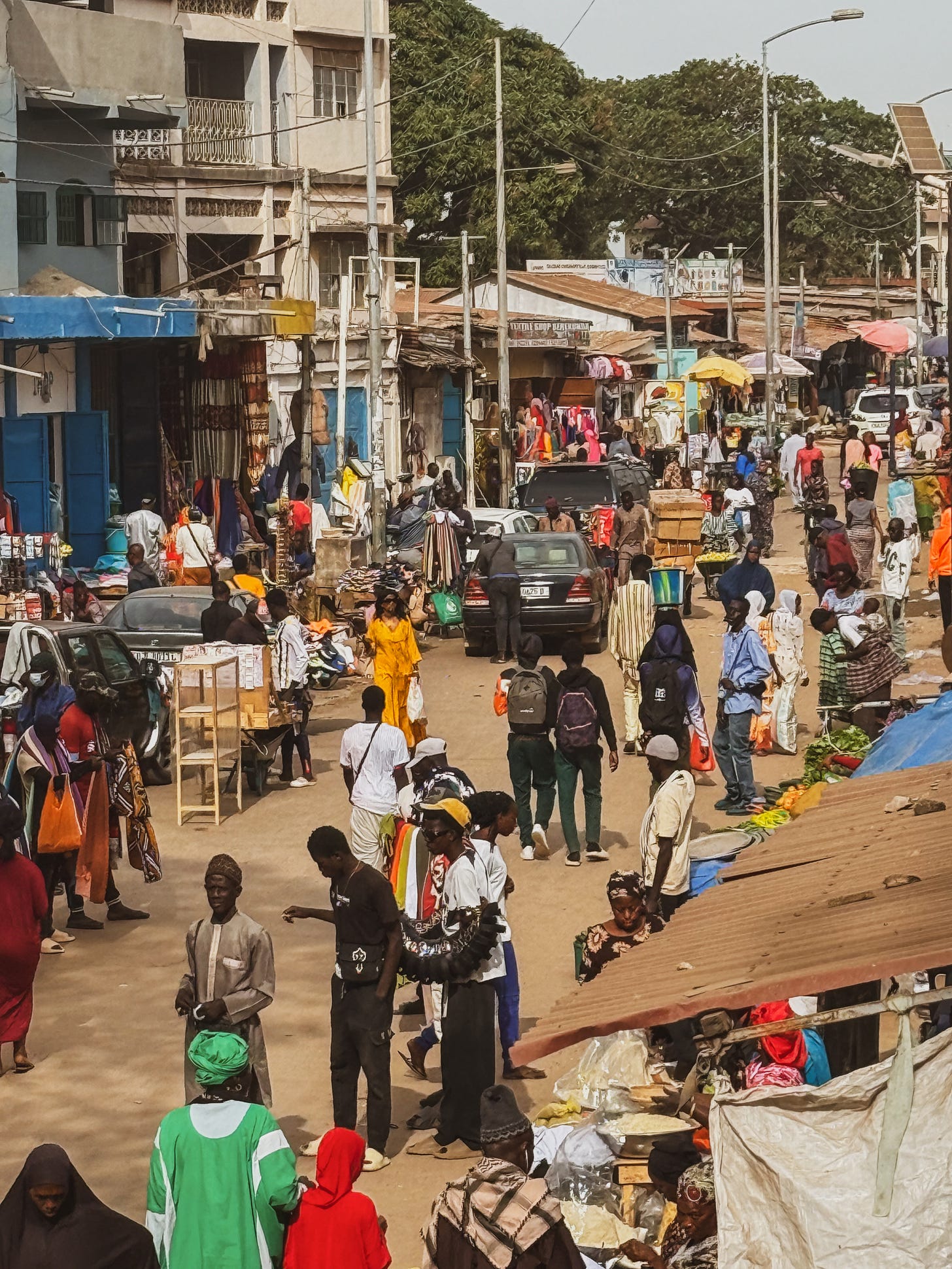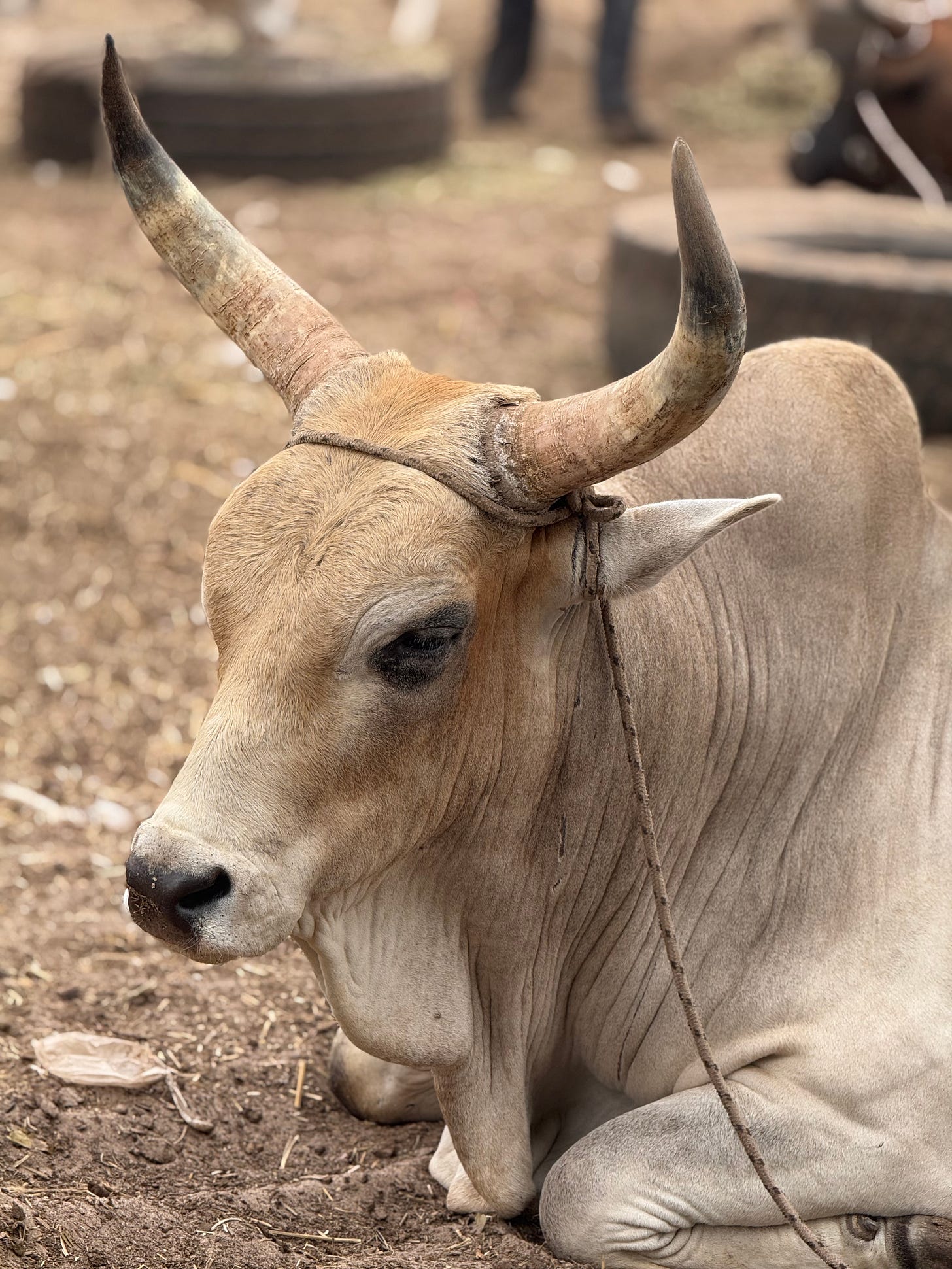What Can We Learn from The Gambia’s Food Model?
When we think about food systems, we naturally compare them to what we know. For me, that’s the UK—where farming has become increasingly industrialised, small abattoirs are disappearing, and we’re reliant on a supermarket-driven food chain that disconnects us from how our food is produced.
The Gambia, in contrast, operates very differently. It’s a country where smallholder farming dominates, where markets are alive with local produce, and where food isn’t wrapped in plastic or pumped with preservatives to keep it looking fresh for weeks. It’s an agricultural system that, in many ways, functions more naturally—yet struggles against modern challenges like food imports, land access, and foreign exploitation of resources.
A Market Like No Other
Serekunda Market is an assault on the senses. Walking through, you’re hit with the overwhelming smells of fish, spices, and open-air cooking. Vendors spill onto the red-dust streets, balancing baskets of fruit on their heads, while stallholders negotiate over piles of rice, dried fish, and vegetables.
The further in you go, the more you see the true local food system at play. Unlike the touristy sections, where souvenirs and cheap clothing dominate, the heart of the market is all about fresh, unprocessed food—grown without the chemicals and interventions we rely on in the UK.
This way of trading food, while chaotic by Western standards, feels incredibly honest. Small-scale farmers, many growing on tiny plots of land, bring their produce here to sell. There’s no artificial preservation, no months-long shelf life, no convoluted supply chains—just people growing food and selling it directly to those who eat it. It’s a stark contrast to our supermarket-driven culture, where food often travels thousands of miles before it reaches our plates.
The Land Problem: Can Large-Scale Farming Work in The Gambia?
Farming in The Gambia is small-scale by necessity. Land ownership laws make it difficult to acquire large plots, with most land held under customary tenure systems or limited to 99-year leaseholds. This means large-scale agricultural enterprises are rare, and those that do exist—such as GHE (Gambia Horticultural Enterprises) and Radville Farms—are almost entirely export-driven.
Meanwhile, the country imports nearly half of its food. Rice, a staple in Gambian diets, is imported in huge quantities despite local production potential. The dependence on imports leaves the country vulnerable to price fluctuations and trade imbalances. Strengthening local food production could not only improve food security but also boost the rural economy.
And yet, part of me wonders: does The Gambia have something right? While UK agriculture has increasingly favoured large-scale, industrialised operations, The Gambia still supports smallholder farming as the backbone of its food system. Could we, in the UK, take inspiration from their model instead of pushing for ever-larger farms?
A Different Kind of Meat Market
One of the most fascinating stops on our journey was a visit to a Gambian abattoir—an experience that left me questioning some of the assumptions we have about animal slaughter in so-called "developed" vs. "developing" countries.
Our taxi driver described it as a “nature reserve,” which was slightly misleading—perhaps an easier way to explain to a white couple with young children that it was a place to see animals! What we found was a busy livestock market where goats, sheep, and cattle were bought and sold—some taken straight to slaughter, others purchased by farmers to graze their land.
What struck me was the difference in atmosphere compared to many UK slaughterhouses. In Britain, abattoirs have become centralised, with fewer and fewer small-scale facilities available, leading to long transport times and high-stress environments for livestock. In The Gambia, despite the open-air setup and lack of Western-style facilities, the animals didn’t seem stressed. There were no panicked cries, no chaotic handling—just quiet grazing before the inevitable.
Surprisingly, The Gambia’s slaughter process isn’t vastly different from ours. The main abattoir in Abuko follows a similar method: stunning before slaughter, followed by bleeding out. Hygiene remains a challenge due to water access and infrastructure, but overall, the process isn’t as “barbaric” as some might assume when thinking of African food systems. In fact, there are elements of it that seem preferable to the high-stress, industrialised meat processing we see in UK factory farming.
The Fight for Fish: Foreign Exploitation of Gambian Waters
Before travelling to The Gambia, I was particularly interested in Sanyang—a coastal area where many British expats settle and where land is available for purchase through the tourism board.
But once we arrived, locals warned us against buying land there. The reason? The stench.
Paradise Beach, once known for its pristine beauty, has been tainted by the fishing industry. A Chinese-owned fishmeal processing plant dominates the coastline, churning out fishmeal for export while leaving the air thick with the smell of rotting fish and burning plastic.
The Gambia’s fishing industry has come under increasing pressure from foreign trawlers—primarily Chinese and Senegalese—that overfish local waters, leaving little for traditional fishermen. The impact has been devastating. Gambian and Senegalese fishing boats are forced to travel further afield, and with job prospects dwindling, some of these boats aren’t just carrying fish anymore—many have turned into vessels transporting people illegally to Europe in desperate search of a better life.
What Can We Learn?
This journey through The Gambia has made me think deeply about the way we produce and consume food.
In the UK, we’ve lost touch with food production. We expect cheap, abundant food, but at what cost? Our reliance on imports, supermarket supply chains, and industrial farming has distanced us from where our food really comes from.
In The Gambia, food systems are more direct. People buy from markets, not supermarkets. They eat seasonally, not out of convenience. They rely on small farms, not industrialised supply chains.
But they also face real challenges—land ownership issues, reliance on imports, and foreign exploitation of resources. The UK isn’t perfect, but neither is The Gambia. There’s no one-size-fits-all answer to food security.
Yet perhaps, rather than assuming our way is best, we should be looking at places like The Gambia and asking: what are they doing better than us?
Farming is Under Threat—Help Keep These Conversations Going
If you’ve enjoyed this deep dive into Gambian food systems, I’d love for you to become a paid subscriber on Substack. Farming is constantly under threat, and your support doesn’t just help me keep writing—it directly supports our farm and family.
Paid subscribers get exclusive content, behind-the-scenes insights, and direct engagement on these topics. Let’s challenge our food systems together!












